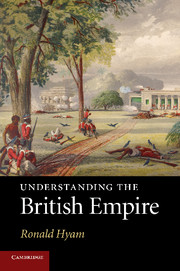Book contents
- Frontmatter
- Contents
- List of plates
- List of figures
- List of maps
- List of tables
- Preface
- Acknowledgements
- List of abbreviations
- Introduction: perspectives, policies, and people
- I Dynamics: geopolitics and economics
- II Ethics and religion
- III Bureaucracy and policy-making
- IV Great men
- 10 Winston Churchill's first years in ministerial office, 1905–1911
- 11 Churchill and the colonial empire
- 12 Smuts in context: Britain and South Africa
- V Sexuality
- VI Imperial historians
- Published writings of RH on imperial history
- Index
11 - Churchill and the colonial empire
Published online by Cambridge University Press: 05 August 2012
- Frontmatter
- Contents
- List of plates
- List of figures
- List of maps
- List of tables
- Preface
- Acknowledgements
- List of abbreviations
- Introduction: perspectives, policies, and people
- I Dynamics: geopolitics and economics
- II Ethics and religion
- III Bureaucracy and policy-making
- IV Great men
- 10 Winston Churchill's first years in ministerial office, 1905–1911
- 11 Churchill and the colonial empire
- 12 Smuts in context: Britain and South Africa
- V Sexuality
- VI Imperial historians
- Published writings of RH on imperial history
- Index
Summary
[This is a revised version of ‘Churchill and the British empire’, in Churchill (ed. Robert Blake and Wm. Roger Louis, Oxford, 1993); the change of title indicates better the limits of coverage, India being the subject of a separate chapter in that volume, by Sarvepalli Gopal. As published, the article was subject to editorial cuts, and the notes were truncated. The original, intended, text is here restored.]
Not altogether enthusiastically, Churchill returned to the Colonial Office on 13 February 1921 as secretary of state in Lloyd George's coalition government. He remained there for twenty months until the formation of Bonar Law's Conservative ministry towards the end of October 1922. This chapter focuses upon Churchill's policies towards the dependent colonies during this period, so it excludes a consideration of the Imperial Conference of 1921 (which he masterminded), and of the conclusion of the Irish Treaty (to which he contributed considerably). But the analysis is set within the broader context of Churchill's attitude towards the colonial empire during his ministerial career as a whole.
Despite his fertile engagement with the colonies as parliamentary under-secretary of state, 1905 to 1908, the question arises: was Churchill thereafter even interested in the colonial empire? Was it not the case that ‘His interest in the empire never absorbed him entirely at the Colonial Office, and it may indeed have been very nearly exhausted by it’?
- Type
- Chapter
- Information
- Understanding the British Empire , pp. 319 - 341Publisher: Cambridge University PressPrint publication year: 2010

